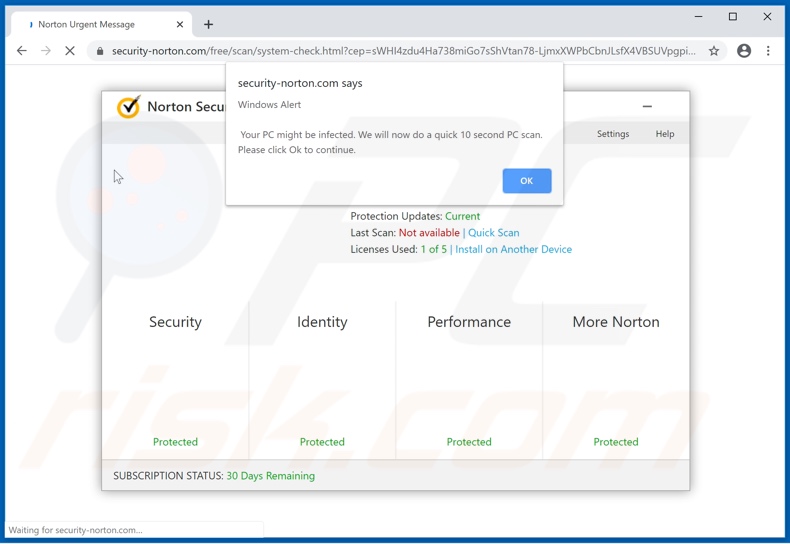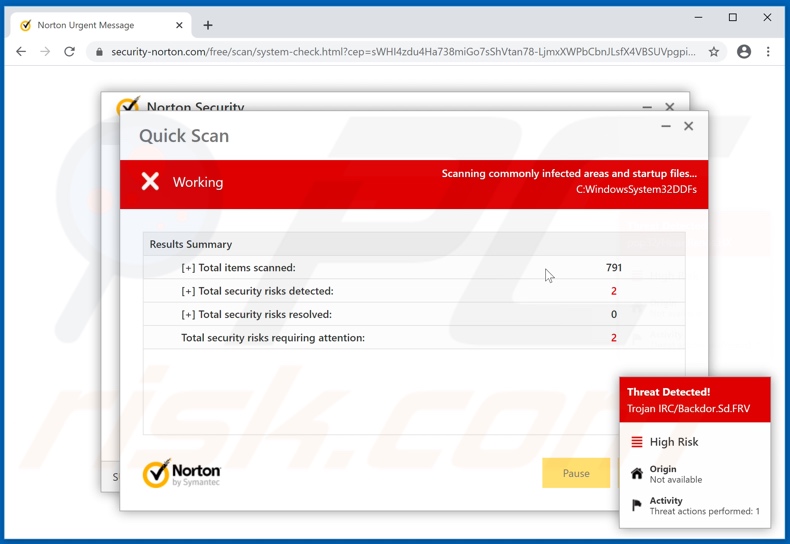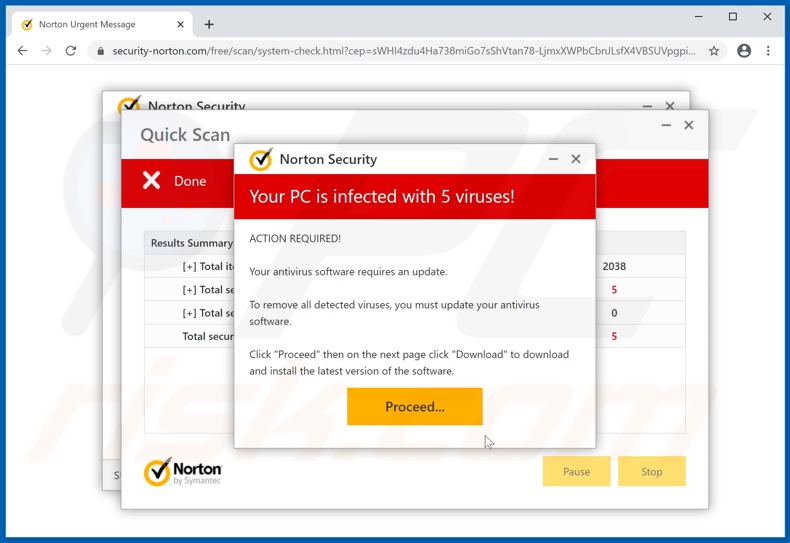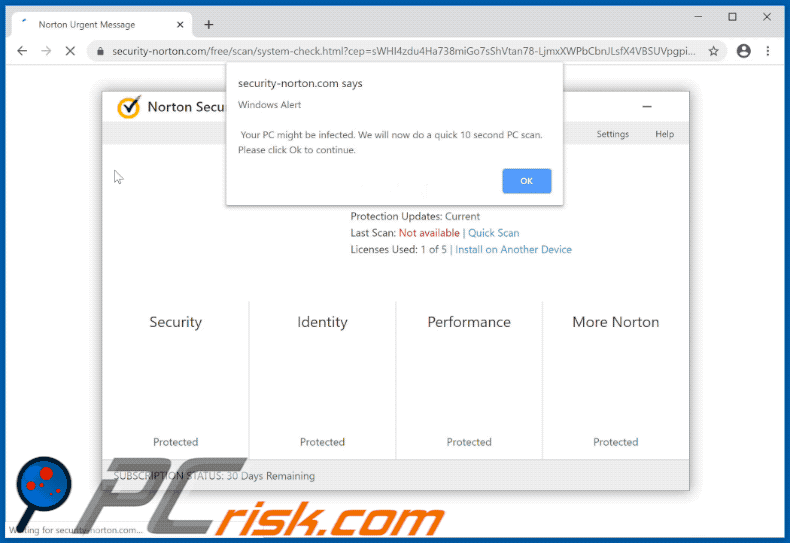Avoid downloading dubious content promoted by the Quick 10 second PC scam
Phishing/ScamAlso Known As: "Quick 10 second PC" pop-up
Get free scan and check if your device is infected.
Remove it nowTo use full-featured product, you have to purchase a license for Combo Cleaner. Seven days free trial available. Combo Cleaner is owned and operated by RCS LT, the parent company of PCRisk.com.
What is the "Quick 10 second PC scan" scam?
"Quick 10 second PC scan" is a scam run on various deceptive websites. It shares many similarities with the "Norton Subscription Has Expired Today" scheme and operates by claiming that devices might be infected and advising users to perform a quick system scan.
The bogus scan 'finds' various nonexistent viruses and states that the anti-virus software requires an update. Be aware that no site can run such scans or detect threats/issues present. Therefore, all information provided by "Quick 10 second PC scan" is false.
This scam is designed to promote a variety of dubious and possibly malicious content. Most users access deceptive/scam web pages unintentionally - typically, they are redirected by intrusive ads or Potentially Unwanted Applications (PUAs) already infiltrated into the system.

Once accessed, visitors are presented with a pop-up window. The text informs them that their devices might be infected and advises them to run a "quick 10 second PC scan". After the "OK" button is clicked, the scam claims to perform a scan (which is fake). Another pop-up window is then displayed.
It claims that the system is infected with five viruses and immediate action is required. It elaborates that, to remove the detected threats, users must update their anti-virus software. They are instructed to press the "Proceed..." button and download the newest updates from the next page.
Following these instructions will not update the Norton anti-virus program (the text presented in this scheme does not specify Norton, but is indicated by the graphics logo associated with this software). These deceptive claims are in no way associated with Norton. "Quick 10 second PC scan" is merely a scam blatantly misusing the name of the Norton program/company.
At the time of research, the "Proceed..." button redirected to a bank web page, however, scams such as "Quick 10 second PC scan" are usually employed to promote bogus system cleaning tools, adware, browser hijackers and other PUAs. They can even promote malicious content (e.g. ransomware, trojans and other malware).
Unwanted and malicious software is commonly distributed using fake software updaters, but it can have other disguises as well. You are strongly advised against trusting "Quick 10 second PC scan" or other scams using similar scare tactics.
As well as force-opening deceptive/scam sites, PUAs can cause redirects to sale-oriented, untrusted, rogue, compromised and malicious pages. These unwanted applications have varied capabilities. Adware-types deliver intrusive ads (e.g. pop-ups, surveys, coupons, banners, etc.), which significantly diminish the browsing experience.
Furthermore, once these advertisements are clicked, they redirect to similarly dangerous websites and can even stealthily download/install rogue content (e.g. PUAs). Another type is the browser hijacker, which modifies browsers and restricts/denies access to their settings.
Regardless of their type, most PUAs can track data. They record browsing activity (browsing and search engine histories) and gather sensitive information derived from it (IP addresses, geolocations and users' personal details). The collected data is often shared with third parties, seeking to misuse it for financial gain - potentially, by putting it to criminal use.
To summarize, PUAs can cause various system infiltration and infections, lead to financial loss, serious privacy issues and even identity theft. Therefore, to ensure device and user safety, remove all suspicious applications immediately upon detection.
| Name | "Quick 10 second PC" pop-up |
| Threat Type | Phishing, Scam, Social Engineering, Fraud. |
| Fake Claim | Scam claims that the user's device is infected and that the anti-virus software is outdated. |
| Related Domains | security-norton[.]com |
| Serving IP Address (security-norton[.]com) | 104.31.85.142 |
| Distributed Unwanted Apps | Promotes a variety of dubious content. |
| Symptoms | Fake error messages, fake system warnings, pop-up errors, hoax computer scan. |
| Distribution methods | Compromised websites, rogue online pop-up ads, potentially unwanted applications. |
| Damage | Loss of sensitive private information, monetary loss, identity theft, possible malware infections. |
| Malware Removal (Windows) |
To eliminate possible malware infections, scan your computer with legitimate antivirus software. Our security researchers recommend using Combo Cleaner. Download Combo CleanerTo use full-featured product, you have to purchase a license for Combo Cleaner. 7 days free trial available. Combo Cleaner is owned and operated by RCS LT, the parent company of PCRisk.com. |
"Your McAfee Subscription Has Expired", "Computer Detected To Be Corrupted", and "Activation Warning Alert" are some examples of other scams akin to "Quick 10 second PC scan". These schemes attempt to trick users into downloading/installing and/or purchasing nonoperational, untrusted or malicious software.
Alternatively, this scam model is used to encourage users into calling expensive and fake technical support lines, allowing cyber criminals (claiming to be tech support specialists) to access to their systems, and so on.
The only purpose of such scams is to generate revenue for the designers at users' expense. Ignore and close websites displaying warnings/alerts regarding the integrity of systems immediately.
How did potentially unwanted applications install on my computer?
Some PUAs have "official" download web pages, which are often promoted by deceptive/scam sites, however, they can be downloaded/installed together with other programs as well. "Bundling" is the term used to define this deceptive marketing technique of pre-packing regular software with unwanted or malicious additions.
Rushing download/installation processes (e.g. skipping steps and sections, etc.) increases the risk of inadvertently allowing bundled content onto devices. Intrusive advertisements also proliferate these apps. Once clicked, they can execute scripts, designed to download/install PUAs without users' consent.
How to avoid installation of potentially unwanted applications
You are advised to research all products, before download/installation or purchase. Use only official and trustworthy download sources. Unofficial and free file-hosting websites, Peer-to-Peer sharing networks (BitTorrent, eMule, Gnutella, etc.) and other third party downloaders are untrusted and should not be used.
Additionally, all software should be updated with tools/functions provided by legitimate developers, as opposed to various third party updaters. When downloading/installing, it is important to read the terms, explore all available options, use the "Custom/Advanced" settings and opt-out of additional apps, tools, features, etc.
Intrusive may seem normal and harmless, however, they can redirect to dubious pages (e.g. gambling, pornography, adult-dating and others). If you encounter these ads/redirects, inspect the system and eliminate all suspect applications and browser extensions/plug-ins without delay.
If your computer is already infected with PUAs, we recommend running a scan with Combo Cleaner Antivirus for Windows to automatically eliminate them.
Text presented in the pop-up initially displayed by the "Quick 10 second PC scan" scam:
Windows Alert
Your PC might be infected. We will now do a quick 10 second PC scan.
Please click Ok to continue.
OK
Screenshot of the fake scan performed by "Quick 10 second PC scan" scam:

Text presented in this page:
Background:
Quick Scan
Working
Scanning commonly infected areas and startup files...Results Summary
[+] Total items scanned:
[+] Total security risks:
[+] Total security risks resolved:
Total security risks requiring attention:Pause Stop
Pop-up:Threat Detected!
High Risk
Origin
Not available
Activity
Threat actions performed: 1
Screenshot of the pop-up displayed following the fake scan:

Text presented in this pop-up:
Norton Security
Your PC is infected with 5 viruses!
ACTION REQUIRED!Your antivirus software requires an update.
To remove all detected viruses, you must update your antivirus software.
Click "Proceed" then on the next page click "Download" to download and install the latest version of the software.
Proceed...
The appearance of "Quick 10 second PC scan" pop-up scam (GIF):

Instant automatic malware removal:
Manual threat removal might be a lengthy and complicated process that requires advanced IT skills. Combo Cleaner is a professional automatic malware removal tool that is recommended to get rid of malware. Download it by clicking the button below:
DOWNLOAD Combo CleanerBy downloading any software listed on this website you agree to our Privacy Policy and Terms of Use. To use full-featured product, you have to purchase a license for Combo Cleaner. 7 days free trial available. Combo Cleaner is owned and operated by RCS LT, the parent company of PCRisk.com.
Quick menu:
- What is "Quick 10 second PC" pop-up?
- How to identify a pop-up scam?
- How do pop-up scams work?
- How to remove fake pop-ups?
- How to prevent fake pop-ups?
- What to do if you fell for a pop-up scam?
How to identify a pop-up scam?
Pop-up windows with various fake messages are a common type of lures cybercriminals use. They collect sensitive personal data, trick Internet users into calling fake tech support numbers, subscribe to useless online services, invest in shady cryptocurrency schemes, etc.
While in the majority of cases these pop-ups don't infect users' devices with malware, they can cause direct monetary loss or could result in identity theft.
Cybercriminals strive to create their rogue pop-up windows to look trustworthy, however, scams typically have the following characteristics:
- Spelling mistakes and non-professional images - Closely inspect the information displayed in a pop-up. Spelling mistakes and unprofessional images could be a sign of a scam.
- Sense of urgency - Countdown timer with a couple of minutes on it, asking you to enter your personal information or subscribe to some online service.
- Statements that you won something - If you haven't participated in a lottery, online competition, etc., and you see a pop-up window stating that you won.
- Computer or mobile device scan - A pop-up window that scans your device and informs of detected issues - is undoubtedly a scam; webpages cannot perform such actions.
- Exclusivity - Pop-up windows stating that only you are given secret access to a financial scheme that can quickly make you rich.
Example of a pop-up scam:

How do pop-up scams work?
Cybercriminals and deceptive marketers usually use various advertising networks, search engine poisoning techniques, and shady websites to generate traffic to their pop-ups. Users land on their online lures after clicking on fake download buttons, using a torrent website, or simply clicking on an Internet search engine result.
Based on users' location and device information, they are presented with a scam pop-up. Lures presented in such pop-ups range from get-rich-quick schemes to fake virus scans.
How to remove fake pop-ups?
In most cases, pop-up scams do not infect users' devices with malware. If you encountered a scam pop-up, simply closing it should be enough. In some cases scam, pop-ups may be hard to close; in such cases - close your Internet browser and restart it.
In extremely rare cases, you might need to reset your Internet browser. For this, use our instructions explaining how to reset Internet browser settings.
How to prevent fake pop-ups?
To prevent seeing pop-up scams, you should visit only reputable websites. Torrent, Crack, free online movie streaming, YouTube video download, and other websites of similar reputation commonly redirect Internet users to pop-up scams.
To minimize the risk of encountering pop-up scams, you should keep your Internet browsers up-to-date and use reputable anti-malware application. For this purpose, we recommend Combo Cleaner Antivirus for Windows.
What to do if you fell for a pop-up scam?
This depends on the type of scam that you fell for. Most commonly, pop-up scams try to trick users into sending money, giving away personal information, or giving access to one's device.
- If you sent money to scammers: You should contact your financial institution and explain that you were scammed. If informed promptly, there's a chance to get your money back.
- If you gave away your personal information: You should change your passwords and enable two-factor authentication in all online services that you use. Visit Federal Trade Commission to report identity theft and get personalized recovery steps.
- If you let scammers connect to your device: You should scan your computer with reputable anti-malware (we recommend Combo Cleaner Antivirus for Windows) - cyber criminals could have planted trojans, keyloggers, and other malware, don't use your computer until removing possible threats.
- Help other Internet users: report Internet scams to Federal Trade Commission.
Share:

Tomas Meskauskas
Expert security researcher, professional malware analyst
I am passionate about computer security and technology. I have an experience of over 10 years working in various companies related to computer technical issue solving and Internet security. I have been working as an author and editor for pcrisk.com since 2010. Follow me on Twitter and LinkedIn to stay informed about the latest online security threats.
PCrisk security portal is brought by a company RCS LT.
Joined forces of security researchers help educate computer users about the latest online security threats. More information about the company RCS LT.
Our malware removal guides are free. However, if you want to support us you can send us a donation.
DonatePCrisk security portal is brought by a company RCS LT.
Joined forces of security researchers help educate computer users about the latest online security threats. More information about the company RCS LT.
Our malware removal guides are free. However, if you want to support us you can send us a donation.
Donate
▼ Show Discussion